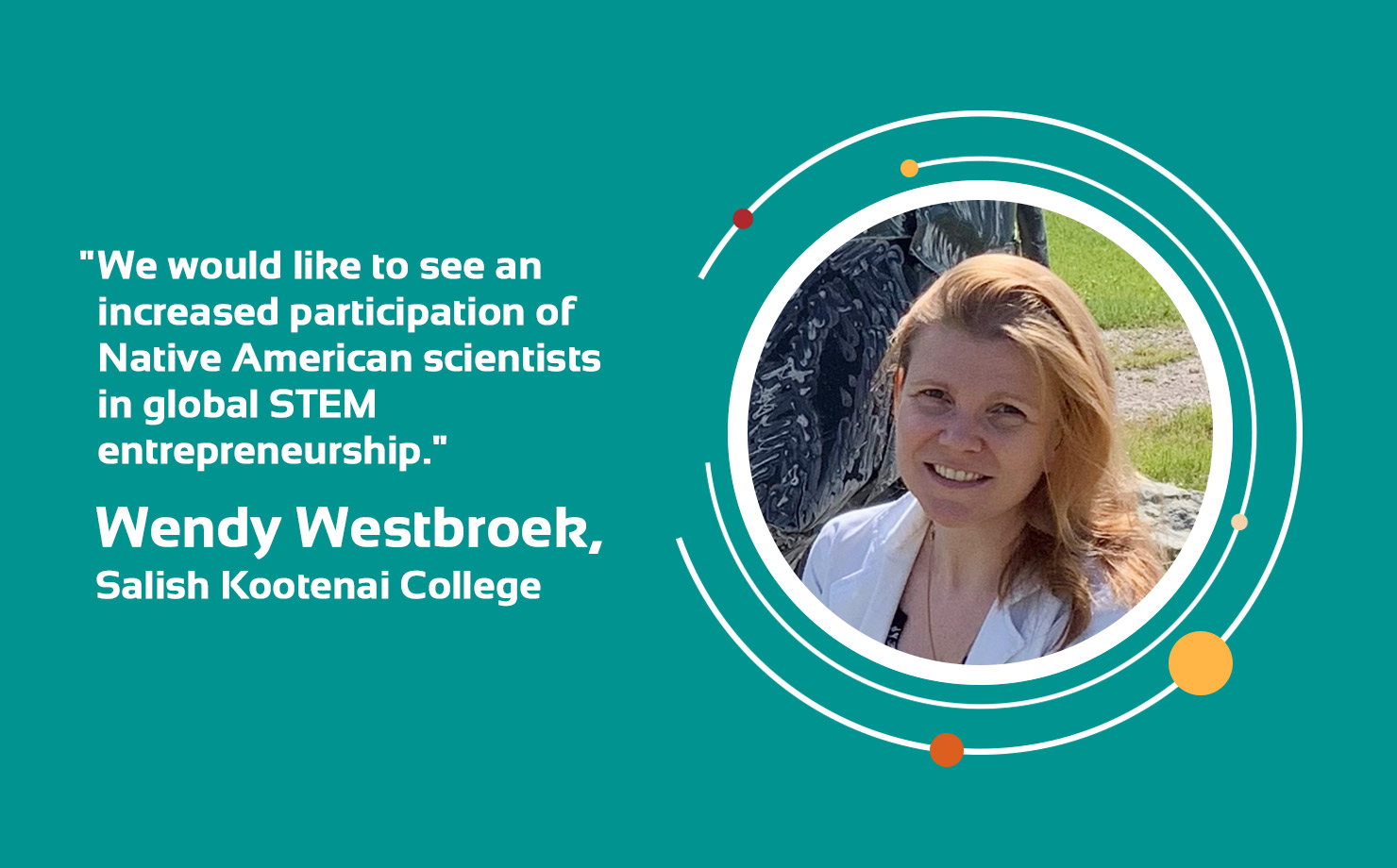
Our Faculty Spotlight series highlights educators within the VentureWell network who are catalyzing change in higher education and motivating students to impact the world through STEM innovation. This month, we spoke with Wendy Westbroek, Professor of Life Sciences at Salish Kootenai College, the Tribal college on the Flathead reservation in Montana. Westbroek is driven to increase STEM engagement and success in Native American communities; she received a Faculty Grant for her course infusing entrepreneurial studies with Tribal contexts. By integrating indigenous practices and cultural knowledge into an entrepreneurial frame, the program intends to cultivate a stronger pipeline of Native American innovators creating positive change in their communities.
how did you get interested in teaching entrepreneurship?
Life Sciences faculty members recognize the desire of students to serve and improve their Native American communities after the completion of their education. Our interest in entrepreneurial education was sparked by the extreme inequity in entrepreneurial efforts and workforce pathways in STEM on reservations. By infusing entrepreneurial learning into the Life Sciences curriculum, we want to empower students and enhance the capacity for entrepreneurship and employment on the Flathead reservation.
what is your favorite thing about teaching?
The core values of Tribal colleges have always been cultural perpetuation and celebration of indigenous identity. I feel privileged to teach at a Tribal College. The experience has enriched my life in many ways, particularly the daily interactions and mutual learning experiences with students. Much of my current teaching style comes from what I learn, on a daily basis, from them. Life Sciences students have deepened my understanding and knowledge of different indigenous cultures and enhanced the content of my courses by contributing cultural elements. Additionally, they have given me a unique window into their lives, which has resulted in an increased awareness of the daily struggles and obstacles faced by non-traditional minority students. These experiences have made me a better instructor, mentor, student advocate, and community citizen.
where would you like to see the field of entrepreneurship in five years?
Even in 2020, the image of the white, older, wealthy male still comes to mind when people think of successful entrepreneurs. The SKC Life Sciences Department wants to contribute to a radical shift of that imagery by including diversity, equity, and inclusivity as integral parts of the future of entrepreneurship. The VentureWell faculty grant will be crucial for the development of entrepreneurial education framed in Tribal context. That framework can be adopted by STEM programs in other Tribal colleges and communities. As outcomes, we would like to see an increased participation of Native American scientists in global STEM entrepreneurship and the rise of Native American innovators that positively impact their Tribal communities.
what are the challenges you’re tackling in your work today?
The enhancement of STEM entrepreneurship in Native American communities on reservations has unique challenges. Presently, there is a lack of Native American role models representing successful STEM entrepreneurship, a lack of access to substantial venture capital funds, limited networking opportunities, and little enhancement of the entrepreneurial mindset and capacity. In the SKC Life Sciences Department, we believe we can tackle these challenges in the curriculum by infusing entrepreneurial learning framed in Tribal context.
what books on entrepreneurship and innovation have you been reading lately?
The last book I read was The Promise of a Pencil by Adam Braun, which narrates his journey from a young professional in finance to a very successful global social entrepreneur. This book resonated with me because of its honesty; Adam’s successes and failures, which were all crucial moments of growth and learning, were equally on display in the story. For me, the highlight of the book was when Adam changed the narrative of his organization from “nonprofit” to “for-purpose”, a pivotal moment in the immense success of his organization. What a brilliant insight!
what’s your most useful classroom activity or assignment?
To increase equity in undergraduate student research experiences, I embed “course-based undergraduate research experiences” or CUREs in my courses. Through CUREs, all students learn how to formulate a scientific question, develop a hypothesis, design experiments, collect and critically analyze data, engage with the scientific literature, and communicate results. Through our VentureWell faculty grant, the Life Sciences Department has the opportunity to expand upon the CURE concept with entrepreneurial thought processes framed in tribal context to address bioscience problems worth solving in Native American communities.
VentureWell Faculty Grants provide up to $30,000 to help fund and support faculty with innovative ideas to create new or transform existing courses and programs to help students develop novel, STEM-based inventions and gain the necessary entrepreneurial skills needed to bring these ideas to market.